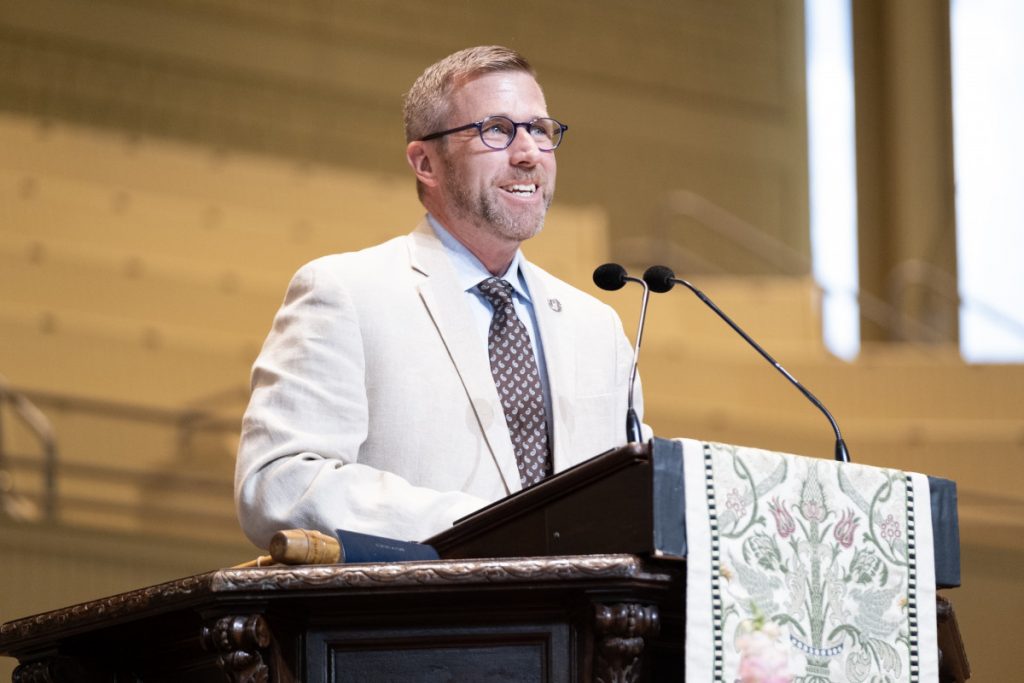
Editor’s Note: These are the prepared remarks for Chautauqua Institution President Michael E. Hill’s annual Three Taps of the Gavel Address, delivered prior to Sunday’s Service of Worship and Sermon in the Amphitheater.
Good morning, and welcome home to Chautauqua.
First, let me extend special greetings to those in this audience who are visiting or experiencing Chautauqua for the first time today. It is my sincere hope that you feel the warmth and sense of collective purpose that has drawn people to these hallowed grounds for 150 years. Many in the audience are part of generational Chautauqua families dating back to 1874, and many others have begun their journey here much more recently. All of you — all of you — are essential to the celebration and stewardship of democratic society that Chautauqua and its mission have represented since its founding. The presence this morning of those from all manner of backgrounds, with deep history here and otherwise, affirms that we continue to live into that mission — and we especially want to welcome those of you taking those first steps on your Chautauqua journey. Welcome. We are so glad you are here.
This summer marks Chautauqua’s 150th season. Our founders Lewis Miller and Bishop John Heyl Vincent came to these shores during the Reconstruction era. Our nation had emerged from the Civil War just nine years prior, and the country remained deeply divided about issues of race, economic class, participation in government, and headlines of a disputed presidential election just a half-year earlier. Does this sound eerily familiar?
In many ways, Reconstruction was intended to heal the wounds of that long period of civil strife, and Chautauqua emerged toward the last years of the era with a similar goal of bringing people together to learn and to make the world a better place. This season we are on the dawn of our sesquicentennial, and we are called to explore anew why the fabric of our society appears to be unraveling in ways not felt for a generation. We also begin our Summer Assembly Season with concerns about artificial intelligence, questions of whether democratic norms can hold and whether we have truly emerged from several years of a pandemic and what might come next.
So what is Chautauqua to do with that lineup of issues? What do we have in store for all those enter our gates or who frequent our exploration through CHQ Assembly?
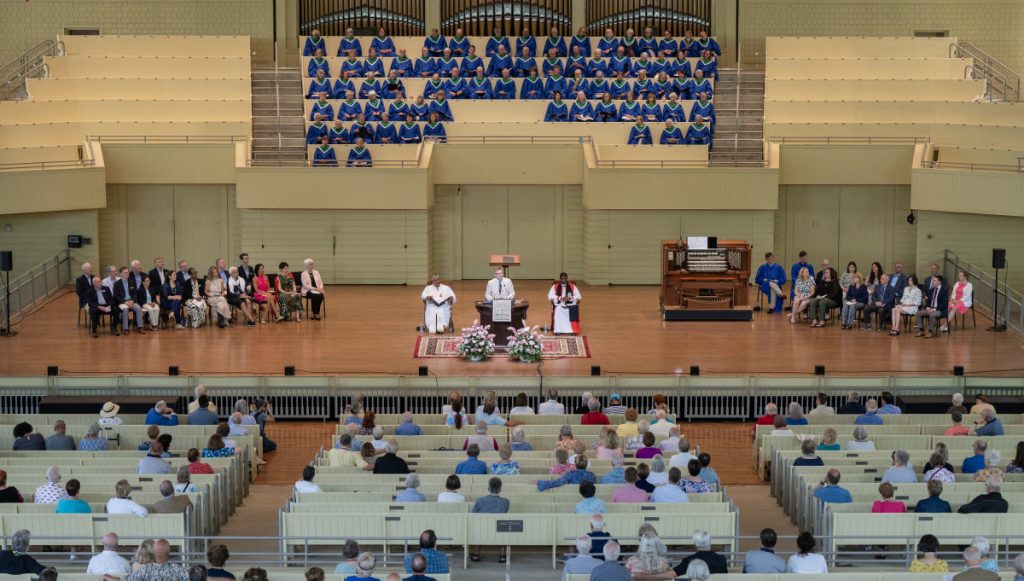
We start this week off with an exploration of “friendship.” That may seem odd or somewhat light to some, but we think it gets at the heart of what’s missing in too many places: how to get along in a deeply polarized world. I’m so excited that we begin tomorrow with Robert George and Cornel West, because I believe their friendship serves as a potent reminder that we are called to engage with one another, especially when we disagree. Drs. George and West are two of the foremost public intellectuals in American life but come from very different schools of thought. They will share with us how such civic friendships, woven across divides, can do more than just strengthen our social fabric but can also help to preserve and strengthen American democracy itself.
As we travel through the next nine weeks, Chautauqua will endeavor to tease out the tools we might consider through looking at moments of joy and consternation. Whether it’s understanding how we connect in community though games or asking the provocative question of “Can the Center Hold?,” our summer together invites us all to consider ways we might play a role in reducing the heat of this moment.
We have spent the last several years talking about the role we have to play in society if our nation’s grand experiment with democracy has a chance to survive. Much of our summer will be spent asking us to consider the very notion of freedom of speech and freedom of expression, and I believe that starts with us here at Chautauqua as we explore so many topics this summer. Each year when we announce our speakers, preachers and artists, through social media, letters or phone calls, those who are about to engage with Chautauqua let us know what they think about our choices almost immediately. I have been struck lately by the deep desire to instantly label individuals who we invite to animate our summer series. We have become quick to weaponize our language, whether that be assigning anything seen as liberal as “woke” or anything conservative as “extreme MAGA.” Perhaps even more sad, while we use those labels so frequently, few can define what either means other than it being the opposite of what they believe.
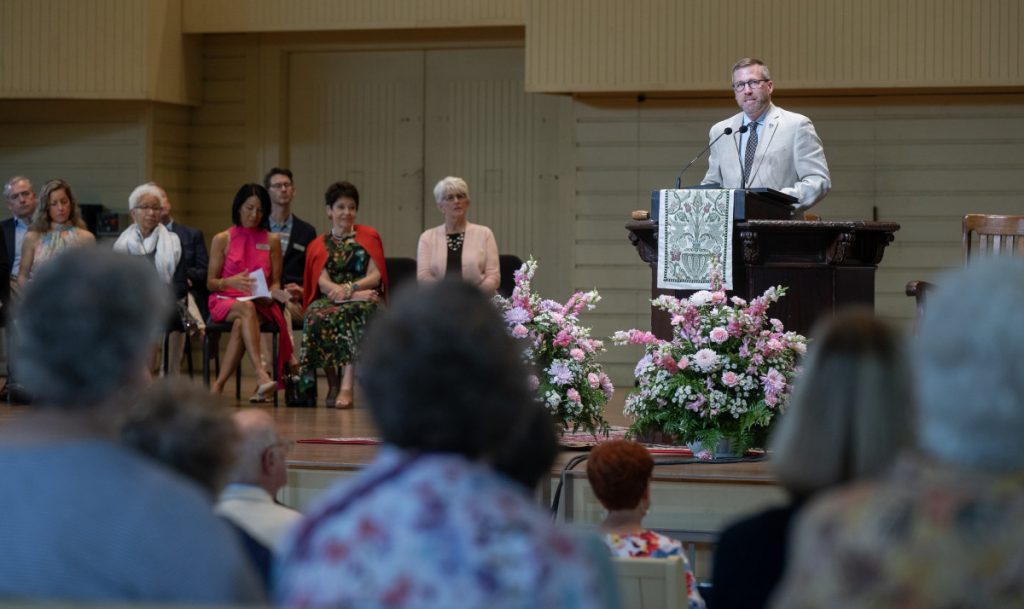
The democratic norm of dialogue which seeks a definition of the common good seems to get thrown out the window too quickly and too often. A columnist in The Washington Post recently noted that expressions of intolerance and bigotry that once were relegated to the fringes are migrating to the center, at the cost of common ground and the common good. It’s as if the very notion that there might be a common ground or a common good is something we’ve decided we shouldn’t work toward unless that common ground or common good is our definition of those two phrases.
We recently lost Dr. Robert Zimmer, the long-time president of the University of Chicago, who was a tireless advocate of freedom of speech and freedom of expression. I am reminded of something he said just a few years ago. He noted of this time, “Fundamentally, people are very comfortable with free expression for those that they agree with. And for those they find disagreeable or wrong, they’re not that eager to have people hear from them (at all).”
Oftentimes when we talk about issues of dialogue here, people ask for examples we can hold up where this is done well or could be followed. I am not usually one to point to popular culture for those examples, and my colleagues will tell you that any attempt at using a sports metaphor usually fails in execution, but I’ll make an exception because of a hit television series that just concluded. How many “Ted Lasso” fans do we have out there?
For those who haven’t watched “Ted Lasso” yet, it tells the story of an American college football coach who is hired to coach an English team — but who knows nothing about that kind of football! The setup is outlandish enough, but the reason Ted is chosen is because the club’s owner wants to embarrass and harm her ex-husband by having the thing he loves most — the football club she now owns after the divorce — fail. I won’t give away too much of the plotline, and if you’re still in Season 3, I won’t spoil the ending, but I’m drawn to the ways that Ted Lasso as a character provides us a blueprint for how we might engage with one another this summer.
Be Curious, Not Judgmental
In one of the earlier episodes in the series, Ted describes how all through his growing up years, he was underestimated, and he didn’t understand why. He concludes that the self-assured feel no need to ask questions, and he suggests to his antagonist that perhaps we should be curious and not judgmental. I think that is such a wonderful prescription for us as we begin this season. Invariably and by design, we are all going to encounter a presentation on one of our stages that we disagree with — or perhaps it will be an encounter with one another.
Our Chautauqua season can be all the richer if our response is not first to judge but rather to ask a question, to be curious: of our participants, of one another, to get to the heart of why someone feels the way they feel. I also hope our curiosity shows up in the ways that we engage as audiences this summer, choosing not to boo what we disagree with or clap at what delights us, but rather that we make a very serious effort to lean in to try to understand what our invited guests are trying to tell us. We can and should recognize that claps or boos can do much to telegraph to the person sitting next to us that we do not care about their thoughts if they disagree with our response. As a group that values community, I know this is never our intent, and the path toward compassionate curiosity is an easy one if we are intentional.
A reporter recently asked me to articulate why we believed that our lectures promoted dialogue among those who may disagree. I shared that I don’t believe our lecturers do that, I believe Chautauquans do this when they take what they heard and try to understand it in community. That’s our power and the invitation in front of us should we accept it. That’s why we are here: not to judge based on perceptions but truly to get to know one another, to dig deep behind the obvious story, and to choose to do it together.
We Should Care
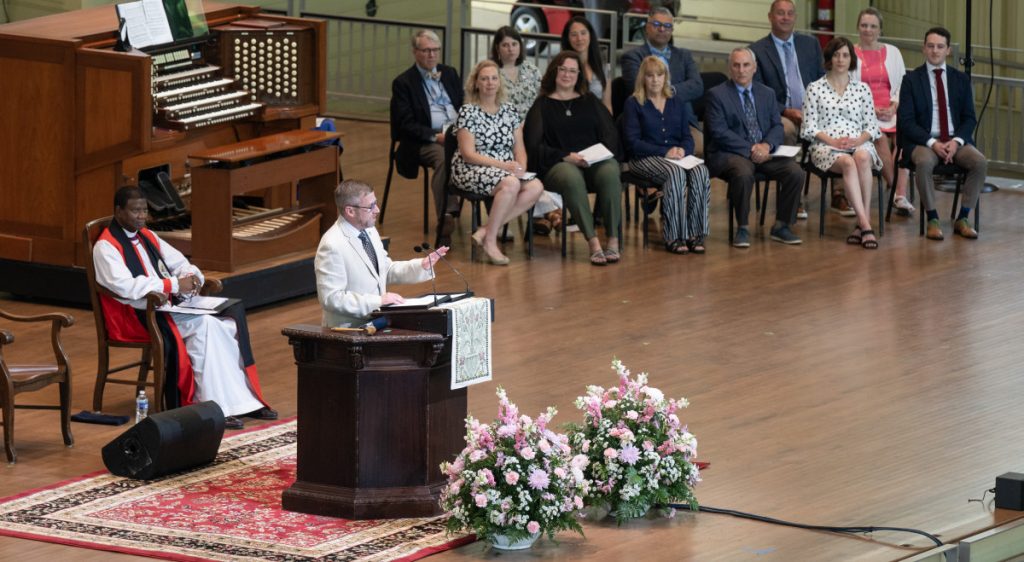
In a scene in Season 3 of “Ted Lasso,” one of the main soccer players comes out as gay to his teammates. His teammates all try to find ways to say that this new fact doesn’t bother them, and in affirmation, they say, “I don’t care” about that. There’s a beat. And then Ted steps in to say, in his way, Wait! “I care. We should care.” That is a perfect reminder for us as we start our summer together. We should care about what is lifting up or weighing on the people around us, what they are carrying with them into the world each day. We should care and appreciate that we are different from our neighbors. And we should value that difference as a strength to be celebrated and not one to be tackled. We should care about each other’s opinions. We should want to understand, because what separates Chautauqua from any other place of inquiry is that we conduct that inquiry in community. It’s an acknowledgement that each of us has a role to play in creating this beloved community, and it acknowledges that each voice, regardless of background and personal circumstances, whether we agree or disagree, needs to be included in the process.
As we start our Summer Assembly together, we can make a choice to be an example of a place where vigorous dialogue around issues is attainable because we have proactively chosen to live into one of Chautauqua’s core values: the dignity and contributions of all people. What sets Chautauqua apart is the love of community. That doesn’t mean we have to agree with one another — it would be boring if we did — but rather we should care to understand why someone holds an alternate opinion or sees the world a different way. Whether you accept this challenge quietly to yourself or actively engage with others on the grounds, creating a reflex of asking a question versus shutting others down with words that suppress dialogue or understanding, your choice can establish Chautauqua as a place that preserves and strengthen the very notion of American democracy itself.
If we wish to uphold democracy, then we must engage with big and small everyday democratic practices. Dialogue across difference is key to democratic practice, and I would argue that we have increasingly lost the ability to be in dialogue with others. If you are seeking opportunities for that one-on-one dialogue, we hope that you will participate in our pilot ‘Red Bench’ project. The idea is simple — for Chautauquans to sit on the red benches as an open invitation for others to come and sit with them and be in dialogue about the themes and ideas presented on our stages. We hope that you will not only engage with this pilot program, but that you will find it rewarding — and perhaps even make a new friend.
“Ted Lasso” invites us to dip our wootsies in the water of understanding one another. We have the potential to model a different way, to celebrate the reason Chautauqua was created, and to demonstrate to the nation that we can emerge from this heated era of disagreement by valuing community-led learning. As we start our 150th season, the invitation has been presented to us. We only need the courage to accept it.
For those who are new to Chautauqua, there is a tradition that declares that the Summer Assembly is not officially convened until the three taps from this historic gavel. May our summer of being curious, our summer of honesty, open hearts and minds, begin anew after the echo of the third tap, and may our efforts be just the beginning of proving that history need not repeat itself, if only we have the courage to accept the charge.
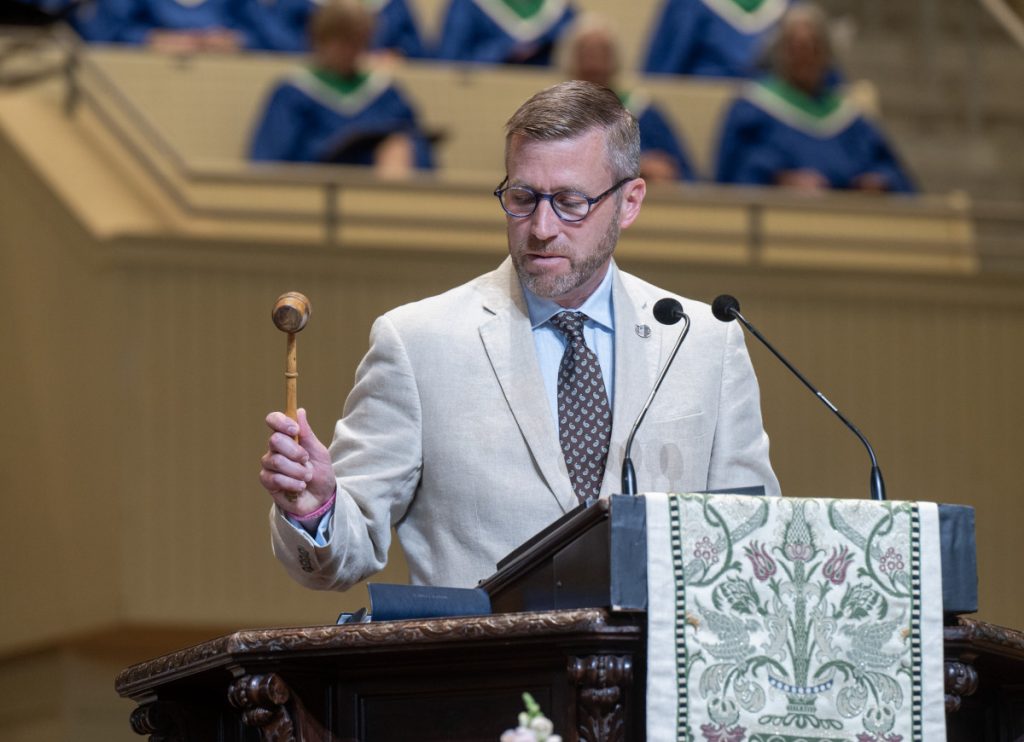
I tap the gavel three times.
Chautauqua 2023 has begun.




